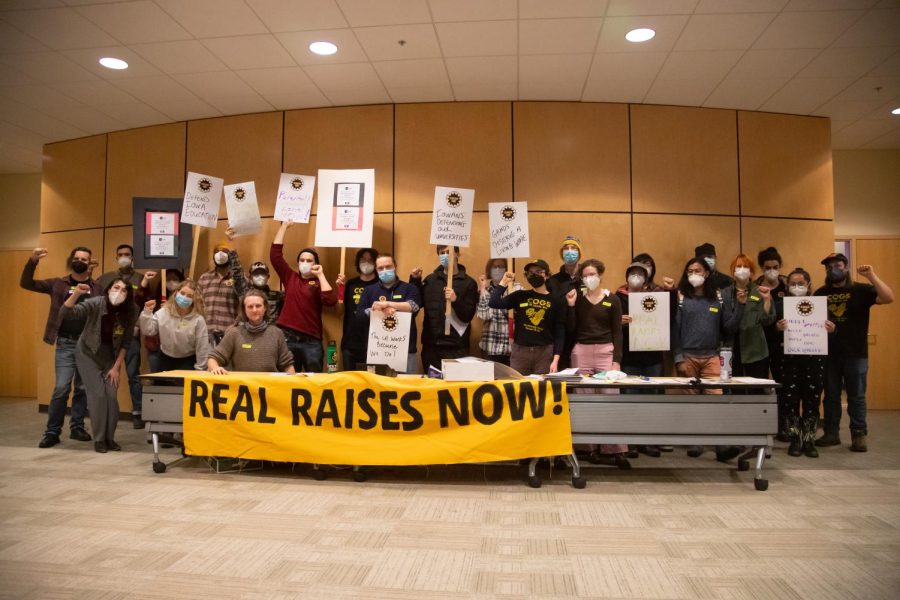UI COGS request 10 percent salary hike, regents offer 3 percent
The Campaign to Organize Graduate Students met with representatives for the state Board of Regents after weeks of campaigning.
The Campaign to Organize Graduate Students, the University of Iowa’s graduate student union, is seen on Thursday, Feb. 16, 2023. COGS is campaigning for a 10 percent increase to graduate student worker wages as well as other benefits.
February 16, 2023
The University of Iowa Campaign to Organize Graduate Students asked the state Board of Regents for a 10 percent wage increase but was offered a 3 percent salary increase in a contract proposal meeting Thursday.
COGS has been campaigning in the weeks leading up to the presentation to the regents and is asking for a salary increase and more benefits including:
- A 10 percent wage increase.
- Twelve weeks of parental leave.
- Access to free parking and/or reimbursement of parking and/or bus fees.
- Access to safe working conditions and personal protective equipment.
COGS President Hannah Zadeh said the campaigns have helped garner the group’s support.
“They’ve been super effective in galvanizing members and community members, and that’s one of our main goals is building up our union because that’s where our power is.” Zadeh said. “The Board of Regents requirements are so, so low. And so, part of that was having all these members show up today and sort of put pressure on the regents representatives.”
During its presentation, COGS showed data that the UI has the second-lowest wage for graduate students of the Big Ten universities, with a base nine-month salary of $20,708. In contrast, Northwestern University has the highest base wage in the Big Ten at $34,176.
The regents proposed a 1.3 percent salary increase in 2020.
COGS Vice President John Tappen said a third of a graduate student’s salary goes toward the cost of living in Iowa City.
“It’s been incredibly difficult, especially in the last several years, for our members to work and live here in Iowa City given the additionally immense financial burden,” Tappen said.
Tappen added that graduate workers receive the most donations from the UI’s Food Pantry program, especially international students.
“Graduate students have received the most donations from the UI Food Pantry since it was established in 2016. International students made up nearly 40 percent of visitors to the Food Pantry last academic year despite being only 7 percent of the total student body. However, roughly 20 percent of our members are international graduate students, which means [it’s] disproportionately affecting our international [students],” Tappen said.
The group also asked the regents for new requests such as a deadline for reappointment letters, and the option to work 20-25 days remotely.
Zadeh said the deadline for letters is to help graduate workers whose advisors don’t submit the letters on time.
“We regularly find that supervisors don’t give graduate workers their appointment letters by that date, even though it’s enshrined in university policy,” Zadeh said. “[It’s] a good example of how when things are in policy versus in contract, we have much less control over implementation of them.”
According to COGS’ proposed contract obtained by The Daily Iowan, graduate workers would “receive a letter of [re]appointment no later than April 15 for the summer and fall semester, or prior to November preceding the spring semester.”
As for the remote work request, Zadeh said it gives graduate workers who are immunocompromised or live with someone who is to choose to stay safe by working remotely.
“We saw, especially in the past several years, that everyone but particularly immunocompromised folks, or people who live with immunocompromised folks, we’re in a terrible situation having to go into work as a TA or an RA and being denied the capacity to work remotely during a pandemic,” she said.
Michael Galloway, an Ahlers & Cooney PC attorney representing the regents, said the proposal was based on the existing contract.
“I want to point out in our proposal that your contract right now provides for a minimum salary, a base salary that must be paid. It doesn’t stop the university from paying above that amount,” Galloway said.
Galloway said the presentations that afternoon were the first step, and negotiations will continue with a closed session meeting set for Feb. 27.
















